St. Francis of Assisi Weekly Reflections
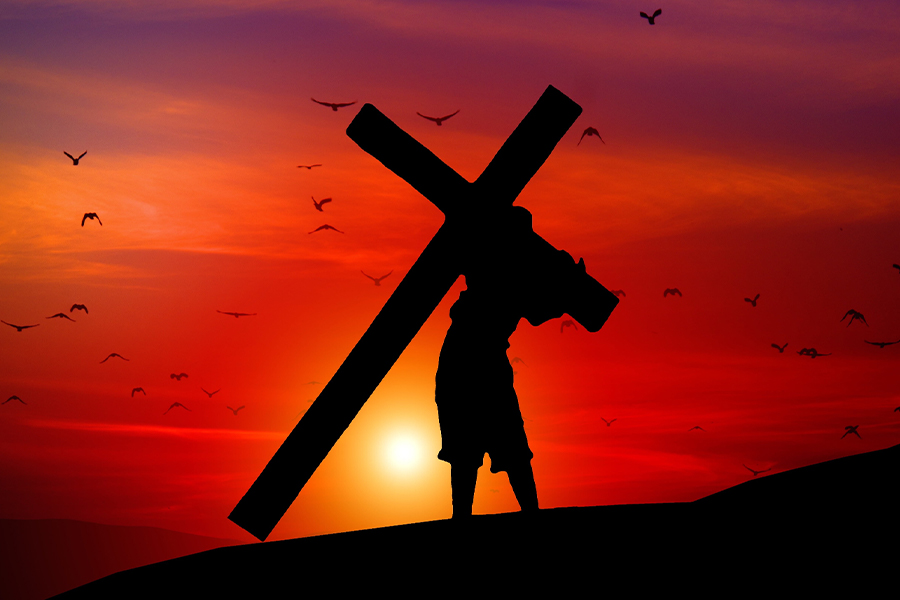
Will You Accompany Him to the Cross?
03-28-2021Weekly ReflectionWe Celebrate Worship Resource, Vol. 46, No. 1When the going gets tough, the tough get going” certainly does not apply to Jesus’ disciples in Mark’s Gospel. Three times Jesus warned them that he would suffer and be put to death, then rise to glory. Each time the disciples made it clear that they did not want to hear that kind of talk. Peter rebuked him, James and John chose to focus on being seated with him in glory, and the other disciples just argued over who was the greatest. Today we hear what happens when they are faced with the cross. Judas betrays him. Peter, James, and John fall asleep as he prays. Peter denies him. One of his followers, who no doubt had once been told to leave everything behind to follow him, literally leaves absolutely everything behind. . . to run away. The going got tough and the disciples fled. Those who honored him when he rode into Jerusalem abandoned him before the cross. Jesus’ disciples were decidedly not heroes; they were flawed human beings. As are we. They made the wrong choices. As do we. But we see Peter break down and weep as soon as he realized he has done exactly what he swore he would not do. This Lent we may have fallen. We may have turned away. Today we pray for the strength to get up, to turn back, to accompany our Lord on the way to the cross. This is the way to which we are called.
How have you let down the Lord? What are you called to do differently?
¿Lo Acompañarás a la Cruz?
Cuandolas cosas se ponen difíciles, los fuertes se lanzan a la carga” ciertamente no se aplica a los discípulos de Jesús en el Evangelio de Marcos. Tres veces Jesús les advirtió que sufriría y moriría, y luego resucitaría a la gloria. Cada vez que los discípulos dejaron en claro que no querían escuchar ese tipo de conversación. Pedro lo reprendió, Santiago y Juan optaron por concentrarse en sentarse con él en la gloria, y los otros discípulos simplemente discutieron sobre quién era el más grande. Hoy escuchamos lo que sucede cuando se enfrentan a la cruz. Judas lo traiciona. Pedro, Santiago y Juan se duermen mientras ora. Pedro lo niega. Uno de sus seguidores, a quien sin duda alguna vez le habían dicho que dejara todo atrás para seguirlo, literalmente deja absolutamente todo atrás. . . pero para huir. Las cosas se pusieron difíciles y los discípulos huyeron. Los que lo honraron cuando entró en Jerusalén lo abandonaron ante la cruz. Los discípulos de Jesús decididamente no eran héroes; eran seres humanos imperfectos. Como somos nosotros. Tomaron decisiones equivocadas. Como nosotros. Pero vemos a Pedro caerse al suelo en llanto tan pronto que se dio cuenta de que había hecho exactamente lo que juró que no haría. Esta Cuaresma puede que nos hayamos caído. Es posible que hayamos huido. Hoy oramos por la fuerza para levantarnos, dar la vuelta, acompañar a nuestro Señor en el camino de la cruz. Esta es la forma a la que estamos llamados.
¿Cómo has defraudado al Señor? ¿A qué estás siendo llamado a hacer de manera diferente?

How do Your Bear Fruit for Others?
03-21-2021Weekly ReflectionWe Celebrate Worship Resource, Vol. 46, No. 1Picture a single grain of wheat: small, insubstantial, easily blown away in a stiff breeze. But we know that from a tiny seed a tall stalk of wheat grows. A handful of seeds can produce a strand of wheat, wheat that can be harvested and ground into flour, flour that can be baked to make bread. When Jesus speaks of grains of wheat, he knows his audience will understand their potential. Jesus sacrificed his life to produce the fruit of salvation for humankind. Obedient to his Father's will, he “became the source of eternal salvation for all who obey him” (Hebrews 5:9). Our lives blossom when we become willing to die to self so that we can produce fruit for others. With God’s will imprinted upon our hearts, we are drawn to Jesus and the new covenant he won for us. We make the choice to follow him and to serve him by seeing him and serving him in our neighbor. Then, joined together with each other in faith and purpose, we become a fertile field of wheat: bread for the hungry, richness for the poor, plenty for the needy.
How do you bear fruit for others?
¿Cómo das Fruto a los Demás?
Imagínese un solo grano de trigo: pequeño, insustancial, que se lleva fácilmente con una brisa fuerte. Pero sabemos que de una pequeña semilla crece un alto tallo de trigo. Un puñado de semillas puede producir una masa de trigo, trigo que se puede cosechar y moler para hacer harina, harina que se puede hornear para hacer pan. Cuando Jesús habla de granos de trigo, sabe que su audiencia comprenderá su potencial. Jesús sacrificó su vida para producir el fruto de la salvación de la humanidad. Obedeciendo la voluntad de su Padre, él “llegó a ser fuente de eterna salvación para todos los que le obedecen” (Hebreos 5:9). Nuestras vidas florecen cuando estamos dispuestos a morir a nosotros mismos para poder producir frutos para los demás. Con la voluntad de Dios impresa en nuestros corazones, nos atrae Jesús y el nuevo pacto que ganó para nosotros. Tomamos la decisión de seguirlo y servirlo al verlo y servirlo en nuestro prójimo. Entonces, unidos en la fe y el propósito, nos convertimos en un campo fértil de trigo: pan para los hambrientos, riqueza para los pobres, abundancia para los necesitados.
¿Cómo das fruto a los demás?
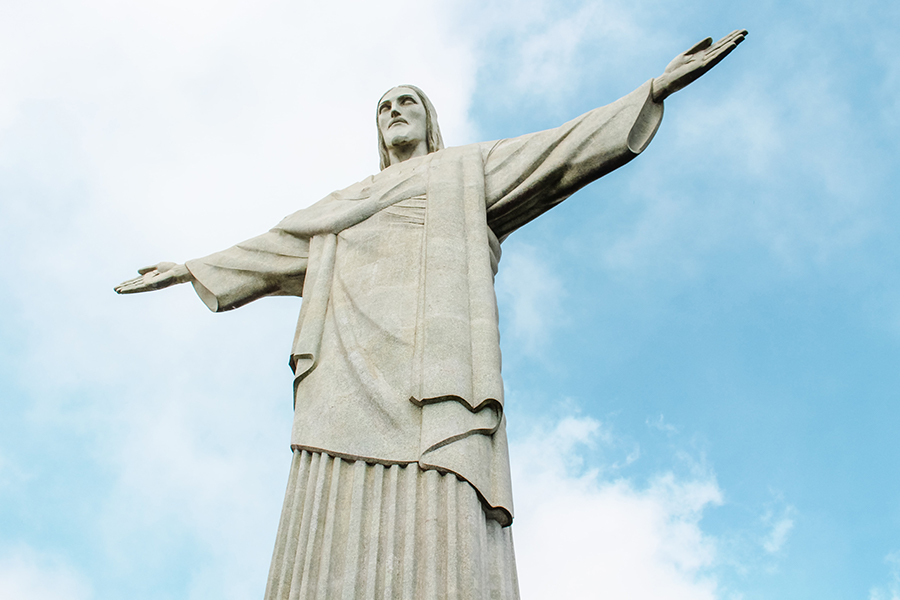
How Does God Lift You Back Up?
03-14-2021Weekly ReflectionWe Celebrate Worship Resource, Vol. 46, No. 1Imagine if Jesus had been sent by God to condemn the world. Some may have thought this after he drove out the money changers and merchants from the temple—the passage we heard last week. Today in the first reading, we hear a condemnation of the unfaithful people who polluted the Lord’s temple. But even though God would have been justified in sending Jesus to condemn humanity for its sinfulness, this is not what God chose to do. God sent the Messiah out of mercy and compassion, so that we “might not perish but might have eternal life” (John 3:16). Jesus reminds Nicodemus of his ancestors’ journey through the Sinai. In the desert filled with venomous snakes, Moses lifted up a bronze serpent that brought life to all who trusted God. To a fallen world God lifts up the Son of Man, bringing life to all who trusted in God. To a fallen world God lifts up the Son of Man, bringing life to all who seek the light. Four weeks into Lent, we likely have had occasions when we have given in to temptation, when we have fallen. But no matter our transgressions we are God’s handiwork. God cares for us so dearly that we are still invited, all invited, always invited, into God’s loving embrace.
How have you fallen this Lent? How does God lift you back up?
¿Cómo te levanta Dios?
Imagínese si Jesús hubiera sido eviado por Dios para condenar al mundo. Algunos pueden haper pensado esto después de que expulsó a los cambistas y comerciantes del templo, en el pasaje que escuchamos la semana pasada. Hoy, en la primera lectura, escuchamos una condenación de las personas infieles que contaminaron el templo del Señor. Pero a pesar de que Dios hubiera sido justificado al enviar a Jesús para condenar a la humanidad por su pecaminosidad, esto no es lo que Dios eligió hacer. Dios envió al Mesías por misericordia y compasión, para que “no perezcamos, sino que tengamos vida eterna” (Juan 3:16). Jesús le recuerda a Nicodemo el viaje de sus antepasados por el Sinaí. En el desierto lleno de serpientes venenosas, Moisés levantó una serpiente de bronce que dio vida a todos los que confiaban en Dios. A un mundo caído, Dios levanta al Hijo del Hombre, trayendo vida a todos los que confían en Dios. A un mundo caído, Dios levanta al Hijo del Hombre y da vida a todos los que buscan la luz. Cuatro semanas después de la Cuaresma, probablemente hemos tenido ocasiones en las que hemos cedido a la tentación, cuando hemos caído. Pero no importa nuestras transgresiones, somos obra de Dios. Dios se preocupa tanto por nosotros que todavía estamos invitados, todos somos invitados, siempre invitados al abrazo amoroso de Dios.
¿Cómo te has caído durante esta Cuaresma? ¿Cómo te levanta Dios?
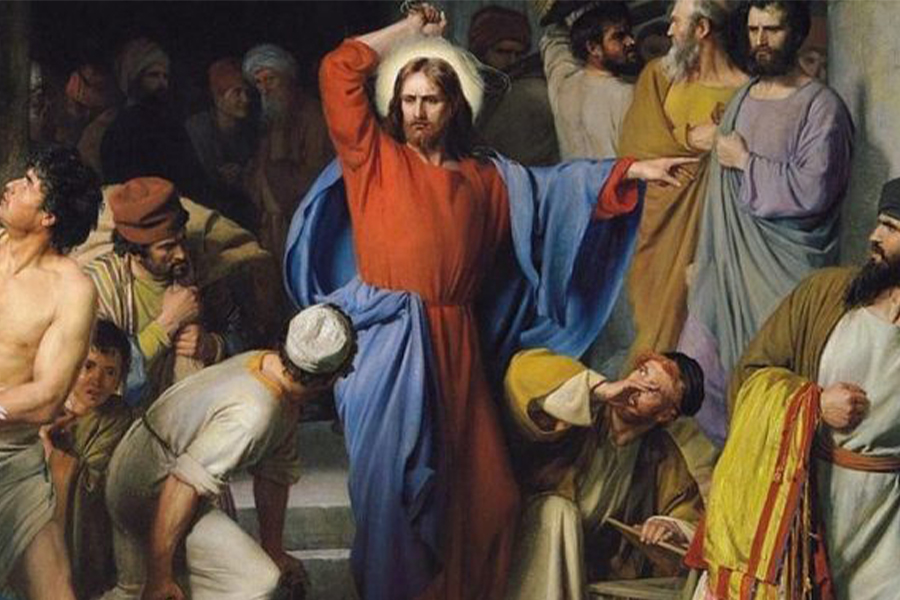
Destroy this Temple and in Three Days I will Raise it Up
03-07-2021Weekly ReflectionWe Celebrate Worship Resource, Vol. 46, No. 1The practice of employing money changers in the temple precincts made sense. With Passover near, many pilgrims traveled for days, counting on paying merchants in the temple area for the animals required to sacrifice. The coins of the Roman Empire bore the image of Caesar or of pagans gods, so money changing was required. But Jesus’ presence puts all this in a new perspective. No need to sacrifice sheep or doves; they are made obsolete by Jesus’ own sacrifice. The temple, the sign of God’s presence here on earth, is supplanted by the presence of God’s own Son. It is not a matter of rejecting the former; it is that Jesus is the fulfillment of each. But Jesus does not present it this way, instead saying things like, “Destroy this temple and in three days I will raise it up,” leading authorities to believe he is insane, or worse, dangerous (John 2:19). His words create a “stumbling block” to believers, horrified by his suggestion, and “foolishness” to outsiders, seeing it as ridiculous 1 Corinthians 1:23). Accepting his cross was neither foolish nor weak, but a sign of wisdom and strength, raising us all up with the promise of defeating sin and death.
What do you do or can you do that looks foolish or weak to others, but expresses the strength and wisdom you have found in Jesus?
Destruyan Este Templo Y en Tres Días Lo Reconstruiré
La práctica de emplear cambitas en los recintos del templo tenía sentido. Con la Pascua cerca, muchos peregrinos viajaron durante días, contando con pagar a los comerciantes en el área del templo por los animales necesarios para el sacrificio. Las monedas del Imperio Romano llevaban la imagen de César o de dioses paganos, por lo que era necesario cambiar dinero. Pero la presencia de Jesús pone todo esto en una nueva perspectiva. No es necesario sacrificar ovejas ni palomas; se vuelven obsoletos por el propio sacrificio de Jesús. El templo, signo de la presencia de Dios en ella en la tierra, es suplantado por la presencia del propio Hijo de Dios. No se trata de rechazar al primero; es que Jesús es el cumplimiento de cada uno. Pero Jesús no lo presenta de esta manera, sino que dice cosas como: “Destruyan este templo y en tres días lo reconstruiré”, lo que lleva a las autoridades a creer que está loco, o peor aún, que es peligroso (Juan 2:19). Sus palabras crean una “piedra de tropiezo” para los creyentes, horrorizados por su sugerencia, y una “locura” para los de afuera, que la ven como ridícula (1 Corintios 1:23). Aceptar su cruz no fue ni tonto ni débil, sino una señal de sabiduría y fuerza, que nos levantó a todos con la promesa de vencer el pecado y la muerte.
¿Qué haces o puedes hacer que a los demás les parezca tonto o débil, pero que exprese la fuerza y la sabiduría que has encontrado en Jesús?

Listen to Him and be Transfigured
02-28-2021Weekly ReflectionWe Celebrate Worship Resource, Vol. 46, No. 1Occasionally we are given a glimpse of an alternate reality hidden just below the surface. It can be a transfigurative moment. Right before the passage we hear today, Jesus had confided that he would suffer, be killed, and rise after three days. Peter did not take this well. So Jesus gave him, James, and John, his closest disciples, a glimpse of an alternate reality. They hear God repeat the words from Jesus’ baptism, which they had not heard, with the additional instruction: “Listen to him” (Mark 9:7). Listen to him when he says what he must face. Listen to him when he says you must take up your cross (which he had also just told them). Listen to him when he says that he will rise from the dead. Listen to him and be transfigured. Abraham’s viewpoint is transfigured when God intervenes. Paul encourages the Romans to look at their lives differently in light of God’s willingness not to spare God’s own Son. Our lives have been transfigured by the One raised to glory at God’s right hand. Can we see the difference?
What can you see when you allow God to transfigure your perspective?
Escúchenlo y Sean Transfigurados
De vez en cuando se nos da un vislumbre de una realidad alterna oculta justo debajo de la superficie. Puede ser un momento transfigurativo. Justo antes del pasaje que escuchamos hoy, Jesús había confiado que sufriría, sería asesinado y resucitaría después de tres días. Pedro no se lo tomó bien. Así que Jesús les dio a él, a Santiago y a Juan, sus discípulos más cercanos, un vislumbre de una realidad alternativa. Ellos escuchan a Dios repetir las palabras del bautismo de Jesús, que no habían escuchado, con la instrucción adicional: “Escúchenlo” (Marcos 9:7). Escúchenlo cuando dice lo que debe enfrentar. Escúchenlo cuando les diga que deben tomar su cruz (que también les acababa de decir a ellos). Escúchenlo cuando dice que se levantará de entre los muertos. Escúchenlo y sean transfigurados. El punto de vista de Abraham se transfigura cuando Dios interviene. Pablo anima a los romanos a ver sus vidas de manera diferente al ver la voluntad de Dios de no perdonar al propio Hijo de Dios. Nuestras vidas han sido transfiguradas por Aquel que fue elevado a la gloria a la diestra de Dios. ¿Podemos ver la diferencia?
¿Que puedes ver cuando le permites a Dios transfigurar tu perspectiva?
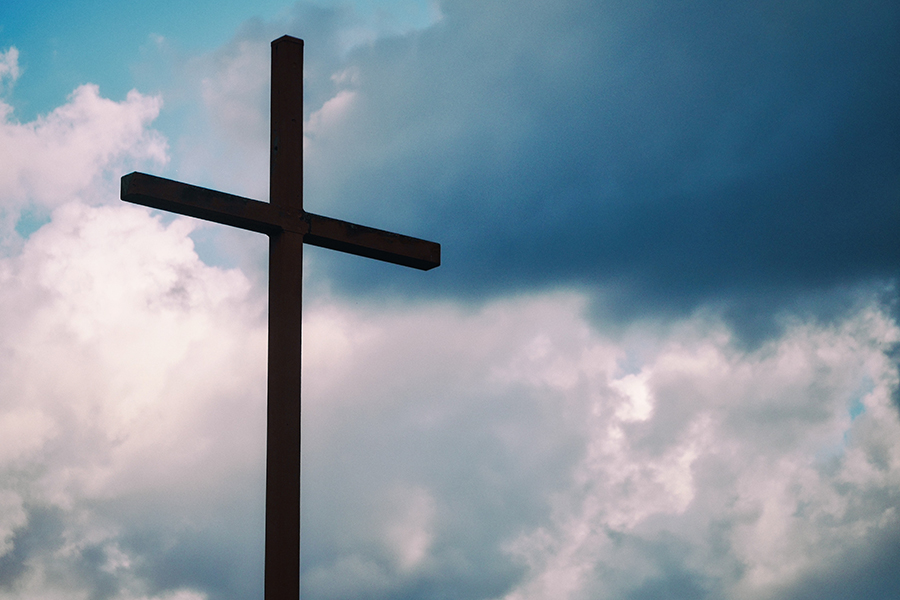
Repent and Believe
02-21-2021Weekly ReflectionWe Celebrate Worship Resource, Vol. 46, No. 1Typically on the first Sunday of Lent we hear a detailed account of Satan’s temptations, but Mark narrows down his account of Jesus’ forty days in the desert to two sentences. Instead he emphasizes Jesus’ message his gospel: “This is the time of fulfillment. The kingdom of God is at hand. Repent, and believe in the gospel” (Mark 1:15). In three terse sentences, Jesus summarizes his mission. During Lent we bring to mind the suffering Jesus endured to accomplish his mission, but we would be remiss if we did not keep in mind the point of his mission. God’s love for us all, God’s mercy for us, God’s desire for us each to repent and believe is stronger that any flood, any disobedience, any power Satan. Among all humanity, only Noah and his family were saved. But now God assures us that this will never happen again. God’s covenant with humanity, renewed through Abraham, Moses, David, and now Jesus, further and further tilting in our favor, remains in force as sure as a rainbow follows a storm, as sure as our baptism binds us to salvation. Repent and believe, for this is the time of fulfillment.
How can you live out your baptismal commitment during this time of fulfillment?
Arrepiéntanse y Crean
Normalmente, el primer domingo de Cuaresma escuchamos un relato detallado de las tentaciones de Satanás, pero Marcos reduce su relato de los cuarenta días de Jesús en el desierto a dos frases. En su lugar enfatiza el mensaje de Jesús, su evangelio: “Este es el tiempo de cumplimiento. El reino de Dios está cerca. Arrepiéntanse, y crean en el Evangelio” (Marcos 1:15). En tres breves frases, Jesús resume su misión. Durante la Cuaresma recordamos el sufrimiento que Jesús soportó para cumplir su misión, pero seríamos negligentes si no tuviéramos en cuenta el objetivo de su misión. El amor de Dios por todos nosotros, la misericordia de Dios por nosotros, el deseo de Dios de que todos nos arrepintamos y creamos es más fuerte que cualquier diluvio, cualquier desobediencia, cualquier poder de Satanás. Entre toda la humanidad, sólo Noé y su familia se salvaron. Pero ahora Dios nos asegura que esto nunca volverá a suceder. El pacto de Dios con la humanidad, renovado a través de Abraham, Moisés, David y ahora Jesús, inclinándose cada vez más a nuestro favor, permanece en la fuerza tan segura como un arco iris sigue a una tormenta, tan seguro como nuestro bautismo nos une a la salvación. Arrepiéntanse y crean, porque este es el tiempo de cumplimiento.
¿Cómo puedes vivir tu compromiso bautismal durante este tiempo de cumplimiento?

Made Clean Through Christ
02-14-2021Weekly ReflectionWe Celebrate Worship Resource, Vol. 46, No. 1How are the leapers in today’s readings made clean? How are we made clean? What does it mean to be made clean? The leprosy addressed in today’s readings refers to any skin disease, any visible and possibly contagious infection. For the health of the community the afflicted person was excluded. Also, because the disease was thought to be a punishment, they were regarded as seriously sinful. So, when the leper came to Jesus asking to be made clean, not only did he want his health restored, he wanted acceptance. He wanted to be readmitted to the community. Jesus crossed both barriers when he reached out and touched this contagious and “sinful” man. Though the external cure was obvious, the internal effect was stronger. After all, Jesus came into this world not to perform individual cures on a few, but to offer salvation to all. Our sinfulness makes us all imperfect, unclean. But like the leper in the Gospel, we call out to the Lord to forgive us, to make us clean, to include us on the way of salvation. We also can follow Saint Paul’s counsel, imitating Christ, reaching out to those who have been cast out and applying Jesus’ healing touch.
When have you felt “made clean” through forgiveness or acceptance?
Herchos Limpios por Cristo
¿Cómo son hechos limpios los leprosos en las lecturas de hoy? ¿Cómo nos limpiamos nosotros? ¿Qué significa estar limpio? La lepra de la cual hablan las lecturas de hoy se refiere a cualquier enfermedad de la piel, cualquier infección visible y posiblemente contagiosa. Por la salud de la comunidad se excluyó a la persona afectada. Además, debido a que se pensaba que la enfermedad era un castigo, fueron considerados como pecadores. Entonces, cuando el leproso se acercó a Jesús para pedirle que lo limpie, no sólo quería que se restaurara su salud, quería que lo aceptaran. Quería ser readmitido en la comunidad. Jesús cruzó ambas barreras cuando extendió la mano y tocó a este hombre contagioso y “pecador”. Aunque la sanación externa era obvia, el efecto interno era más fuerte. Después de todo, Jesús vino a este mundo no para realizar sanaciones individuales en unos pocos, sino para ofrecer salvación a todos. Nuestra pecaminosidad nos hace imperfectos, inmundos. Pero como el leproso en el Evangelio, llamamos al Señor para que nos perdone, para que nos limpie, para que nos incluya en la era de la salvación. También podemos seguir el consejo de San Pablo, imitando a Cristo, acerquémonos a los que han sido expulsados y compartamos el toque sanador de Jesús.
¿Cuándo te has sentido “limpio” por medio del perdón o la aceptación?

Discovering Your Purpose
02-07-2021Weekly ReflectionWe Celebrate Worship Resource, Vol. 46, No. 1Word traveled fast in Capernaum. After Jesus drove an unclean spirit from a man in the synagogue in the morning (last Sunday’s Gospel) and cured Simon Peter’s mother-in-law in the afternoon, “the whole town was gathered at the door” after sunset (Mark 1:33). They were not disappointed, for Jesus spent the evening driving out demons and curing the sick. But it was not enough. The next day, after predawn conversation with his father, Jesus decided to leave Capernaum and set out to nearby villages of Galilee. Why? “For this purpose, have I come” (1:38). Jesus’ mission was to preach the good news, heal the sick, and drive out demons not just in one town, but throughout the land. As is ours. It is no coincidence that Mark’s Gospel ends with the risen Lord returning to Galilee and telling his disciples, “Go into the whole world and proclaim the gospel...drive out demons...lay hands on the sick” (16:15-18). Jesus passed his purpose on to his disciples, as well as to us. Paul embraced that purpose, though he admits he had no choice. Job did not choose his misfortune, but found no purpose, and no hope, to his life. May we find purpose and hope in carrying out Jesus’ mission, our mission.
Have you embraced the challenge of finding purpose in life? What can you do to discover that purpose and live it out?
Descubriendo Tú Propósito
De corrió la voz rápidamente en Cafarnaúm. Después de que Jesús expulsó un espíritu inmundo de un hombre en la sinagoga por la mañana (el evangelio del domingo pasado) y curó a la suegra de Simón Pedro por la tarde, “todo el pueblo se apiñó a la puerta” después del atardecer (Marcos 1:33). No se decepcionaron, ya que Jesús pasó la tarde expulsando demonios y curando a los enfermos. Pero no fue suficiente. Al día siguiente, después de una conversación con su padre antes del amanecer, Jesús decidió dejar Cafarnaúm y partir a pueblos cercanos de Galilea. ¿Por qué? “Para eso he venido” (1:38). La misión de Jesús era predicar las buenas nuevas, sanar a los enfermos y expulsar demonios no sólo en un pueblo, sino en toda la tierra. Como es el nuestro. No es casualidad que el Evangelio de Marcos termine con el Señor resucitado que regresa a Galilea y les dice a sus discípulos: “Vayan por todo el mundo y anuncien las buenas nuevas...expulsarán demonios...pondrán las manos sobre los enfermos” (16:15-18). Jesús transmitió su propósito a sus discípulos, así como a nosotros. Pablo aceptó ese propósito, aunque admite que no tenía otra opción. Job no eligió su desgracia, pero no encontró ningún propósito ni esperanza en su vida. Que encontremos propósito y esperanza al llevar a cabo la misión de Jesús, nuestra misión.
¿Has aceptado el desafío de encontrar un propósito en la vida? ¿Qué puedes hacer para descubrir ese propósito y vivirlo

How does your Faith give you Hope?
01-31-2021Weekly ReflectionWe Celebrate Worship Resource, Vol. 46, No. 1In Jesus' time, when someone acted in an abnormal or dangerous way it would often be attributed to unclean spirits. Unclean spirits had powers that could not be controlled. They held people in the grip of overwhelming evil. In order to combat an unclean spirit, someone would need to overpower it. Using the exact name of the demon could give an opponent power over it. Unfortunately, that power worked both ways. Hence, the man with the unclean spirits tries to call Jesus by name. But recognizing Jesus as “the Holy One of God” (Mark 1:24) does not give the demon the power he needs; it merely acknowledges that Jesus was more powerful. Not only is he the Holy One of God, he is God. Jesus, Son of God, the prophet who God promised Moses would be raised up from among the Chosen People, had indeed come to destroy unclean spirits, those that took control over victims two thousand years ago as well as those that take control over our own lives. Naming that evil—addiction, violence, injustice, racism, oppression— continues to give power to the powerless and hope to the hopeless as we call on the Lord to overpower the demons that prey on us and our neighbor.
What evil makes you feel powerless? How can your faith give you hope?
¿Cómo te da Esperanza tu fe?
En la época de Jesús, cuando alguien actuaba de manera anormal o peligrosa, a menudo se atribuía a espíritus inmundos. Los espíritus inmundos tenían poderes que no podían ser controlados. Mantenían a la gente en las garras de un mal abrumador. Con el fin de combatir un espíritu inmundo, alguien tendría que dominarlo. Usar el nombre exacto del demonio podría darle a un oponente poder sobre él. Desafortunadamente, ese poder funcionaba en ambos sentidos. Por lo tanto, el hombre de los espíritus inmundos trataba de llamar a Jesús por su nombre. Pero reconociendo a Jesús como “el Santo de Dios” (Marcos 1:24) no le da al demonio el poder que necesita; simplemente reconoce que Jesús era más poderoso. No sólo es el Santo de Dios, el es Dios. Jesús, el Hijo de Dios, el profeta que Dios le prometió a Moisés que resucitaría entre el Pueblo Elegido, había venido a destruir los espíritus inmundos, los que tomaban el control de las víctimas hace dos mil años, así como los que toman el control de los nuestras vidas. Nombrar ese mal—adicción, violencia, injusticia, racismo, opresión— continúa dándole el poder a los impotentes y esperanza a los desesperados mientras pedimos al Señor que domine a los demonios que nos atacan a nosotros y a nuestro prójimo.
¿Qué maldad te hace sentir impotente? ¿Cómo puede tu fe darte esperanza?

You Too, Are a Chosen One
01-24-2021Weekly ReflectionWe Celebrate Worship Resource, Vol. 46, No. 1A new adventure can seem exciting and rewarding. But once it begins it can prove to be difficult and scary. Jonah appears to be enthusiastic and successful prophet in today’s reading. But this is because we skipped past the first two chapters of the book. Jonah initially fled from the challenge of confronting Nineveh and ended up in the belly of a whale. Only after his rescue did he cooperate. It is difficult to imagine anyone responding more quickly and dramatically to Jesus than the first four disciples, leaving family and work behind to follow him. But Simon Peter’s enthusiasm dimmed later. He panicked when Jesus said he would suffer and be put to death (“Get behind me, Satan”) and panicked again when Jesus was condemned to death, denying him three times. Meanwhile, James and John demanded to sit next to the risen Lord in glory. On the night Jesus was arrested, Peter, James, and John fell asleep in Gethesemane after being asked to keep watch. Still, they are the ones on whom the Lord chose to rely. They are flawed human beings, as are we all. Paul warns the Corinthians that “the time is running out” (7:29). May this urgency drive our commitment.
Can you be relied on to carry out Jesus’ mission? What holds you back?
Tú También, eres Uno de los Elegidos
Una nueva Aventura puede parecer emocionante y gratificante. Pero una vez que comienza puede resultar difícil y aterrador. Jonás parece ser un profeta entusiasta y exitoso en la lectura de hoy. Pero esto se debe a que pasamos por alto los dos primeros capítulos del libro. Jonás inicialmente huyó del desafío de enfrentarse a Nínive y terminó en el vientre de una ballena. Sólo después de su rescate sí cooperó. Es difícil imaginar a alguien respondiendo más rápida y dramáticamente a Jesús que los primeros cuatro discípulos, dejando atrás a la familia y el trabajo para seguirlo. Pero el entusiasmo de Simón Pedro se atenuó más tarde. Entró en pánico cuando Jesús dijo que sufriría y sería condenado a muerte (“Quítate de delante de mí, Satanás”) y volvió a entrar en pánico cuando Jesús fue condenado a muerte, negándolo tres veces. Mientras tanto, Santiago y Juan exigieron sentarse junto al Señor resucitado en gloria. La noche que arrestaron a Jesús, Pedro, Santiago y Juan se durmieron en Gethesemaní después de que se les pidiera que vigilaran. Aun así, son ellos en quienes el Señor optó por confiar. Son seres humanos imperfectos, como todos nosotros. Pablo advierte a los corintios que “la vida es corta” (7:29). Que esta urgencia impulse nuestro compromiso.
¿Se puede confiar en ti para llevar a cabo la misión de Jesús? ¿Qué te detiene?

Your Faith Will Transform You
01-17-2021Weekly ReflectionWe Celebrate Worship Resource, Vol. 46, No. 1God’s call tends to leave out explicit directions. The Lord calls Samuel repeatedly, never saying, “I’m right here; don’t keep running over to Eli.” Jesus, when asked where he was staying, doesn’t say, “On the other side of town” or “By the Jordan River.” No, God simply called, “Samuel, Samuel!” (1 Samuel 3:10) and Jesus simply said, “Come and you will see” (John 1:39). No specifics, just invitations. In both cases, the person called needed help from someone who recognized the Lord. For Samuel, it was Eli. For Andrew and the other disciple, it was John the Baptist. In turn, for Simon Peter, it was his brother Andrew. Their lives change after their encounters with the Lord. Samuel’s every word now has effectiveness. Andrew immediately tells his brother, “We have found the Messiah” (1:41). Simon’s name is changed to Cephas (“rock” in Aramaic). No wonder Andrew and his friend appear to remember the exact hour of their conversion: “It was about four in the afternoon.” (1:39). The lives of the first disciples Jesus called have been completely transformed and they will never forget the moment it happened.
Can you recall a time when your faith transformed you?
Tú Fe Te Transformará
El llamado de Dios tiende a omitir instrucciones explícitas. El Señor llama a Samuel repetidamente, sin decir nunca: “Estoy aquí; no sigas corriendo hacia Eli.” Jesús, cuando se le preguntó dónde se estaba quedando, no dijo, “al otro lado de la ciudad” o “junto al río Jordán”. No, Dios simplemente llamó: “¡Samuel, Samuel!” (1 Samuel 3:10) y Jesús simplemente dijo: “Ven y verás” (Juan 1:39). Sin detalles, solo invitaciones. En ambos casos, la persona llamada necesitaba ayuda de alguien que reconociera al Señor. Para Samuel, fue Elí. Para Andrés y el otro discípulo, fue Juan el Bautista. A su vez, para Simón Pedro, fue su hermano Andrés. Sus vidas cambiaron después de sus encuentros con el Señor. Cada palabra de Samuel ahora tiene eficacia. Andrés le dice inmediatamente a su hermano: “Hemos encontrado al Mesías” (1:41). El nombre de Simón se cambio a Kefás (que significa “roca” en arameo). No es de extrañar que Andrés y su amigo parezcan recordar la hora exacta de su conversión: “Eran alrededor de las cuatro de la tarde”. (1:39). Las vidas de los primeros discípulos que Jesús llamó se han transformado por completo y nunca olvidarán el momento en que sucedió.
¿Recuerdas algún momento en que tu fe te transformó?
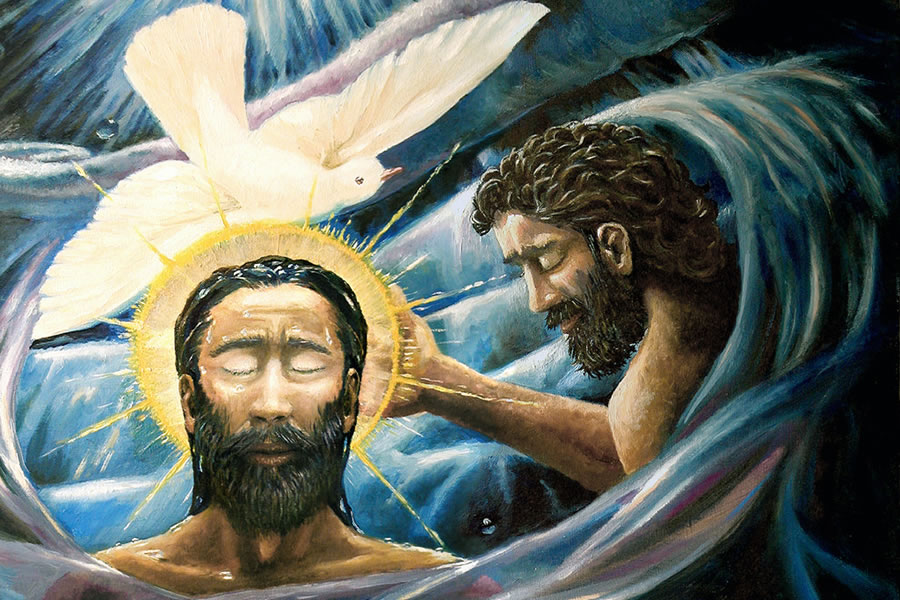
In Baptism, the Holy Spirit Descends Upon Us
01-10-2021Weekly Reflection We Celebrate Worship Resource, Vol. 46, No. 1Among the evangelists, Mark uses the word schizomenous to describe the dramatic way the heavens were “torn open” when Jesus was baptized (Mark 1:10). Through this cleft two important things pass: 1) the Spirit, descending upon Jesus, and 2) the voice of the Father: “You are my beloved Son; with you I am well pleased” (1:11). The divine testifies about the man. This scene foreshadows the one that occurs when Jesus dies on the cross and the veil of the sanctuary is torn in two. At that moment, the centurion exclaims, “Truly this man was the Son of God!” (15:39). A man testifies about the divine. We hear a lot of testimony today. Isaiah testifies about the one who is to come. Peter testifies in the house of the Gentile Cornelius that “God shows no partiality”(Acts 10:34). John explains that the Spirit, water and blood all testify that Jesus is the Son of God, referring to both his baptism and his death. Like the rain and snow of Isaiah’s poem, which descend from the heavens to make the earth fertile and fruitful, the Spirit descends upon on our Lord, rending the fabric that separates the divine from the human. In baptism, the Holy Spirit also descends upon us. May we be fertile soil for God’s word and become fruitful in following God’s call.
How can you be fruitful in this new year?
En el Bautismo, el Espíritu Santo desciende sobre Nosotros
Entre los evangelistas, Marcos usa la palabra esquizomeno (división) para describir la forma dramática en que los cielos fueron “rasgados” cuando Jesús fue bautizado (Marcos 1:10). Por esta hendidura pasan dos cosas importantes: 1) el Espíritu, que desciende sobre Jesús, y 2) la voz del Padre: “Tú eres mi Hijo amado; en ti me complazco” (1:11). Lo divino testifica sobre el hombre. Esta escena presagia la que ocurre cuando Jesús muere en la cruz y el velo del santuario se rasga en dos. En ese momento, el centurión exclama: “¡Verdaderamente este hombre era el Hijo de Dios!” (15:39). Un hombre da testimonio de lo divino. Hoy escuchamos muchos testimonios. Isaías testifica sobre el que ha de venir. Pedro testifica en la casa del gentil Cornelio que “Dios no hace distinción de personas” (Hechos 10:34). Juan explica que el Espíritu, el agua y la sangre testifican que Jesús es el Hijo de Dios, refiriéndose tanto a su bautismo como a su muerte. Como la lluvia y la nieve del poema de Isaías, que descienden de los cielos para hacer la tierra fértil y fecunda, el Espíritu desciende sobre nuestro Señor, rasgando el tejido que separa lo divino de lo humano. En el bautismo, el Espíritu Santo también desciende sobre nosotros. Que seamos tierra fértil para la palabra de Dios y seamos fructíferos al seguir el llamado de Dios.
¿Cómo puedes ser fructífero en este nuevo año?

Welcoming the “Others”
01-03-2021Weekly ReflectionWe Celebrate Worship Resource, Vol. 46, No. 1Many millennia ago, all humanity was considered one family. Witness Abraham, common ancestor of Jews, Christians, and Muslims. But as time went on and generations passed, the family tree expanded to the point that divisions became easier to notice than unity. Isaiah mentions the foreign lands of Midian, Ephah, and Sheba, all located on the Arabian Peninsula. Midian was Abraham's son by his second wife, half brother to Isaac. Ephah was Midian's son and Sheba was the son of Midian's brother. But by Isaiah's time, the people of these nations were no longer part of Abraham's family's reunions. They may have been trading partners or they may have been rivals, but they were definitely "others". Isaiah saw it differently. These "others", these foreigners with different traditions and different customs were drawn to the holy city as well. Not only did they visit, they came with caravans of riches and voices of praise to God. Centuries later, Jesus draws foreigners, wise men, who also bring riches and praise to God. Some (Herod) prefer to see differences rather than unity (this "king of the Jews" consituted a threat to his position), but Paul asserts what we too should realize: like Jews and Gentiles, we—black or white, host or immigrant, English or Spanish—are all "members of the same body" (Ephesians 3:6).
How can you welcome "others" as Isaiah, Paul, and the Holy Family did?
Dándole la Bienvenida a los "Otros"
Hace muchos milenios, toda la humanidad era considerada una familia. Veamos a Abraham, antepasado común de judíos, cristianos y musulmanes. Pero a medida que pasaba el tiempo y pasaban las generaciones, el árbol genealógico se expandió hasta el punto de que las divisiones se volvieron más fáciles de notar que la unidad. Isaías menciona las tierras extranjeras de Madián, Efa y Sabá, todas situadas en la Península Arábiga. Madián era hijo de Abraham de su segunda esposa, medio hermano de Isaac. Efa era el hijo de Madián y Sabá era el hijo del hermano de Madián. Pero para la época de Isaías, el pueblo de estas naciones ya no era parte de las reuniones familiares de Abraham. Pueden haber sido socios comerciales o pueden haber sido rivales, pero definitivamente eran los “otros”. Isaías lo vio de manera diferente. Estos “otros”, estos extranjeros con diferentes tradiciones y diferentes costumbres fueron atraídos también a la ciudad santa. No sólo visitaron, vinieron con caravanas de riquezas y voces de alabanza a Dios. Siglos más tarde, Jesús atrae a extranjeros, sabios, que también traen riquezas y alabanza a Dios. Algunos (Herodes) prefieren ver las diferencias en lugar de lo común (este “rey de los judíos” constituía una amenaza para su posición), pero Pablo afirma lo que nosotros también debemos darnos cuenta: como judíos y Gentiles, nosotros, negros o blancos, anfitriones o inmigrantes, ingles o español, somos todos “miembros del mismo cuerpo” (Efesios 3:6).
¿Cómo puedes darle la bienvenida a “otros” como lo hicieron Isaías, Pablo y la Sagrada Familia?